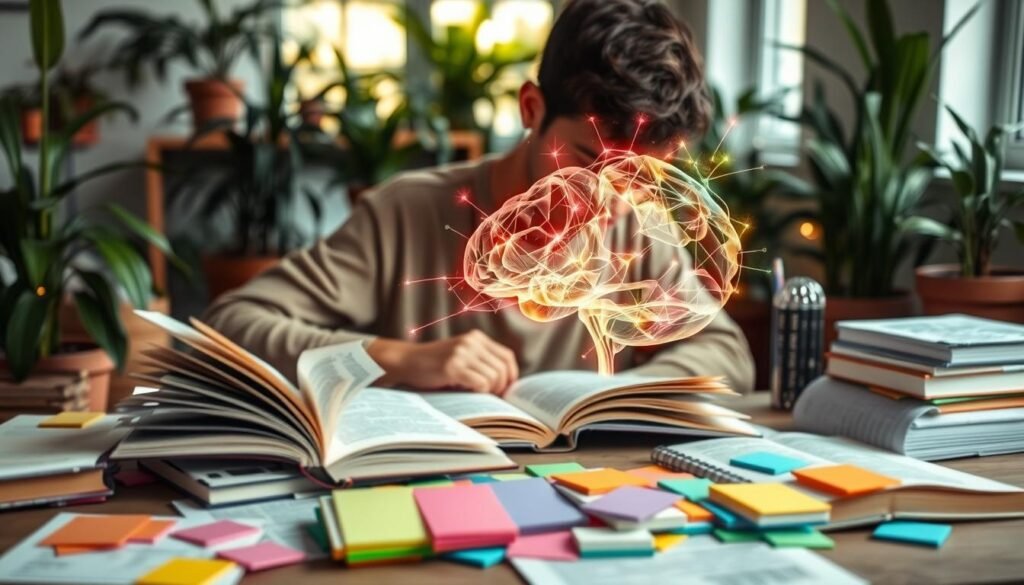As a student, you might feel overwhelmed by schoolwork and studying. But, what if you could learn more efficiently? Studies show that good study habits can really boost your grades. By using the right study methods, you can remember things better and do well in school.
Imagine being able to learn and remember things easily. This is what good study techniques can do for you. In this guide, we’ll show you many ways to improve your learning. You’ll learn how to study better, remember things longer, and do well in school.
Key Takeaways
- Effective study techniques can improve learning outcomes and academic performance
- Active studying techniques, such as creating study guides and working on problems, can help retain information effectively
- Planning and organizing study materials by topic can aid in active reviewing and comprehension of course material
- Utilizing practice tests or questions for retrieval practice can enhance learning efficiency
- Spaced practice, studying complex material over an extended period, is a highly effective study technique
- Creating a conducive study environment, including the right noise level and healthy snacks, can improve concentration and focus
- Effective study techniques, such as mind mapping and active recall, can improve reading comprehension and retention
Understanding the Science Behind Effective Study Techniques
Learning how our brains work can change your study habits. Studies in cognitive psychology show that active learning boosts memory. This makes your study time more effective.
How Your Brain Processes Information
Your brain processes info through different paths. Techniques like spaced repetition strengthen neural connections. This improves how you learn.
Studies at UCSD found that timed study blocks help focus and engagement. This makes studying more productive.
The Role of Memory in Learning
Memory is key for learning. Cramming might work for one test, but it’s not good for long-term memory. Instead, practicing recalling info strengthens your memory.
Cognitive Learning Principles
Important learning principles include mixing different content types and switching study materials. These methods improve understanding and make learning flexible. Researchers like Karpicke and Roediger stress the value of thinking about your learning process.
Creating the Perfect Study Environment
Your study environment plays a big role in how well you improve concentration and study efficiently. A clean, quiet space helps you stay focused and learn better.

- Lighting: Make sure the light is right to avoid eye strain and stay awake.
- Noise Levels: Find a quiet place or listen to soft music to keep your focus.
- Temperature: Keep the room at a comfortable temperature to avoid getting distracted by cold or heat.
- Ergonomics: Use a comfy chair and desk to avoid getting tired or sore during long study times.
To avoid distractions, keep your study area clean and have everything you need close by. Add things like motivational quotes or photos to keep you motivated. Whether you study at home, in the library, or a coffee shop, a well-organized space helps you stay focused and enjoy learning more.
The Pomodoro Technique: Time Management for Better Learning
The Pomodoro Technique is a time management technique that boosts your study sessions. It breaks study time into short intervals. This helps you stay focused and productive.
Setting Up Your Study Sessions
Begin by setting a timer for 25 minutes, called a “Pomodoro.” Focus only on your study material during this time. Francesco Cirillo, the creator, found this time boosts concentration and efficiency.
Managing Break Times Effectively
After each Pomodoro, take a 5-minute break to rest. After four Pomodoros, take a longer break of 15-30 minutes. This balance prevents burnout and keeps your mind sharp for more study.
Tracking Your Progress
Keep a record of each Pomodoro to track your study habits and productivity. Monitoring your progress offers exam preparation tips and shows where to improve your efficient studying methods.
| Pomodoro | Duration | Break |
|---|---|---|
| 1 | 25 minutes | 5 minutes |
| 2 | 25 minutes | 5 minutes |
| 3 | 25 minutes | 5 minutes |
| 4 | 25 minutes | 15-30 minutes |
Active Recall: The Most Powerful Study Strategy
Active recall is a top study tip for boosting memory and understanding. It’s different from passive review because it makes you actively recall information. This strengthens the brain’s pathways for long-term memory.

Adding active recall to your study habits can really help you grasp tough concepts. Here are some ways to try it:
- Use flashcards to test your knowledge on key terms and concepts.
- Create and answer practice questions based on your notes.
- Teach the material to a study partner or even to yourself.
Studies by Roediger & Karpicke (2006), Larsen et al. (2009), and Kornell et al. (2009) show active recall’s benefits. It not only improves memorization but also boosts academic performance.
At first, active recall might seem tough. But with practice, it gets easier. It leads to better studying over time.
Note-Taking Methods That Actually Work
Good note-taking turns study habits into strong learning tools. It helps you understand and remember better. The right learning methods can really boost your grades.
The Cornell Method
The Cornell Method was created in the 1950s by Prof. Walter Pauk of Cornell University. It divides notes into sections for cues, notes, and summaries. This method helps you listen better and think critically, making studying easier.
Mind Mapping Techniques
Mind mapping is great for those who learn better visually. It uses graphics and colors to connect ideas. Tools like Goodnotes help with the Boxing Method, making it easier to see how ideas relate.
Digital vs. Traditional Note-Taking
Whether you prefer digital or traditional note-taking depends on you. Digital methods are flexible and organized. Traditional methods, like pen and paper, can help you remember better. Mixing both can make studying more effective.
| Method | Benefits | Best For |
|---|---|---|
| Cornell Method | Organized structure, easy review | Active learners, structured study sessions |
| Mind Mapping | Visual connections, better understanding | Visual learners, complex topics |
| Digital Note-Taking | Easy to edit, searchable | Tech-savvy individuals, collaborative work |
| Traditional Note-Taking | Enhances memory retention, no tech needed | Preference for handwriting, minimal distractions |
Memory Enhancement and Retention Strategies
Improving your memory is key for studying well and doing well in school. By using proven strategies, you can learn and remember better.
One important study strategy is elaborative rehearsal. This means linking new info to what you already know. It makes memories stronger by creating connections.
Mnemonic devices like acronyms and the method of loci are also great. They make hard info easier to remember and recall.
Spaced repetition is another good method. It involves studying at different times. This helps your brain keep info longer and forget less.
- Regular exercise boosts the hippocampus, helping with verbal memory and learning.
- Meditation improves episodic memory, making it easier to remember daily events.
- Eating right, with healthy fats and glucose, helps long-term memory.
- Getting enough sleep is key for memory, as lack of sleep hurts focus and retention.
- Visual tools like concept maps and illustrations help visual learners remember better.
Using these strategies can make learning more efficient and improve your grades. Regular practice and the right methods make a big difference in remembering and using what you study.
Group Study: Maximizing Collaborative Learning
Joining a study group can really boost your learning. Studies show that working together leads to better grades. The mean weighted effect size is 0.54, beating out studying alone.
Here are some tips for a great study group:
Organizing Effective Study Groups
- Keep the group size between three and five members.
- Assign specific roles and rotate them regularly to ensure participation.
- Plan study sessions to last between one and three hours with a 10-minute break midway.
Peer Teaching Benefits
Teaching others helps you learn more. A study found that small groups improve grades and attitudes towards learning.
Virtual Study Sessions
Online platforms offer flexible study times. Use Zoom or Microsoft Teams for online sessions. This keeps everyone involved and contributing.
Using these strategies can improve your grades and retention. Here’s a quick summary:
| Strategy | Description | Benefits |
|---|---|---|
| Small Group Size | 3-5 members | Enhanced participation and reduced conflict |
| Role Assignment | Specific roles for each member | Prevents dominance and encourages responsibility |
| Structured Sessions | 1-3 hours with breaks | Maintains focus and productivity |
| Virtual Tools | Use of online platforms | Flexible and accessible study options |
Test Preparation and Exam Strategy
Getting ready for exams can feel overwhelming. But, with the right exam preparation tips, you can feel confident on test day. First, make a study plan that divides your material into smaller chunks. This helps you cover everything without feeling too stressed.
- Use spaced repetition to enhance memory retention.
- Practice active recall by testing yourself regularly.
- Create personalized quizzes to reinforce your understanding.
Good study strategies include making notes and using old exams for practice. Studying with friends can also help you understand and remember important ideas better.
“Successful exam preparation is not about how much you study, but how well you prepare.”
Here are some academic success tips for exam day:
- Make sure to get a good night’s sleep to keep your brain sharp.
- Eat a healthy breakfast to keep your energy up.
- Arrive early at the test location to calm down and get settled.
- Quickly look over the test to plan your time wisely.
- Start with the easier questions to get a boost of confidence.
It’s important to manage your stress. Try relaxation techniques like deep breathing or short walks to stay focused and calm during the exam.
| Strategy | Benefit |
|---|---|
| Spaced Repetition | Enhances long-term memory retention |
| Active Recall | Improves understanding and recall of information |
| Personalized Quizzes | Reinforces knowledge through repetition |
| Group Study Sessions | Facilitates collaborative learning and diverse perspectives |
| Relaxation Techniques | Reduces stress and enhances focus |
Using Technology to Enhance Your Study Sessions
In today’s digital world, using technology in your studies can really help. The right tools make learning fun and more effective. They help you study better.
Best Apps for Studying
- Lumosity: Offers cognitive training exercises to improve memory and attention.
- CogniFit: Provides personalized brain training programs tailored to your needs.
- XMind: A mind mapping tool that helps in organizing complex information visually.
- MindMeister: Facilitates collaborative mind mapping for group studies.
Online Learning Resources
There are many websites that shows the importance of education in our life and platforms like Khan Academy, Coursera, and edX. They offer lots of courses and tutorials. These sites add new views and materials to your studies.
Digital Organization Tools
Tools like Trello, Asana, and Microsoft OneNote make managing your studies easier. They help you stay on top of deadlines and keep your notes organized. This makes studying more efficient.
| Tool | Purpose | Key Features |
|---|---|---|
| Lumosity | Cognitive Training | Memory games, attention exercises |
| CogniFit | Brain Training | Personalized programs, progress tracking |
| XMind | Mind Mapping | Visual organization, brainstorming tools |
| MindMeister | Collaborative Mapping | Real-time collaboration, sharing options |
Maintaining Physical and Mental Well-being While Studying
It’s key to balance studying with taking care of your body and mind. This balance helps you focus better and do well in school.
Exercise is great for your brain. It keeps you sharp and helps you remember things. Try walking, yoga, or cycling every day.
Good food is important for your brain. Eat fruits, veggies, and whole grains to help your memory. Don’t forget to drink plenty of water to stay energized.
Getting enough sleep is crucial. Aim for 7-9 hours each night. This helps your mind rest and get ready for new challenges.
- Practice mindfulness or meditation to reduce stress.
- Set aside time for hobbies and relaxation.
- Establish a consistent sleep schedule.
Keeping a healthy balance between work and life is important. It stops burnout and keeps you motivated. By taking care of yourself, you improve your study habits and set yourself up for success.
| Strategy | Benefits |
|---|---|
| Regular Exercise | Improves focus and cognitive function |
| Balanced Nutrition | Enhances memory and concentration |
| Adequate Sleep | Supports memory consolidation and mental health |
| Mindfulness Practices | Reduces stress and anxiety |
| Work-Life Balance | Prevents burnout and maintains motivation |
Conclusion: Building Sustainable Study Habits for Long-term Success
Effective study habits are key to doing well in school. By using the right study techniques, you can make a study plan that works for you. First, check how you study now and set goals to get better.
Keep changing and improving your study ways to stay on track. Good study habits not only help you get better grades. They also help you learn for the rest of your life. Study when you’re most awake to learn better and avoid distractions.
Use active learning methods like practice tests and spaced repetition to remember more. Check how you’re doing and ask for feedback to get even better. By doing these things, you’ll set yourself up for success in school and beyond.
FAQ
What are some effective study techniques to improve learning?
Good study techniques include active recall and the Pomodoro Technique. Also, spaced repetition and various note-taking methods are helpful. These strategies boost memory, focus, and study efficiency, leading to better grades.
How does the Pomodoro Technique help with time management during studies?
The Pomodoro Technique breaks study into 25-minute blocks called “Pomodoros.” After each block, you take a short break. It keeps you focused, prevents burnout, and helps you make steady progress by managing your time well.
What is active recall and why is it considered a powerful study strategy?
Active recall means actively recalling information from memory, like through self-quizzing. It strengthens your memory and understanding by engaging your brain. This makes it more effective than just passively reviewing material.
How can I create the perfect study environment to boost my concentration?
For the best study environment, ensure good lighting and a comfy temperature. Keep the noise down and arrange your space ergonomically. Adding plants or motivational quotes can also help focus and productivity.
What are the best note-taking methods for enhancing learning and retention?
Good note-taking methods include the Cornell Method and mind mapping. These help organize and visualize your notes. Choose digital or traditional methods based on what works best for you. These techniques turn notes into active learning tools.
What memory enhancement strategies can help me retain information better?
To improve memory, use elaborative rehearsal and mnemonic devices like acronyms. Spaced repetition, reviewing information at intervals, also helps retain information long-term.
How can group study sessions improve my learning experience?
Group study offers chances for peer teaching and discussion. This can deepen your understanding and offer new views. Organizing effective groups and using virtual platforms can make group study productive.
What are some effective exam preparation tips to maximize performance?
To prepare for exams, create a study schedule and use active recall and spaced repetition. Practice with past exams and develop strategies for managing time and reducing stress. These tips boost confidence and improve test scores.
How can technology be used to enhance my study sessions?
Technology can enhance studying with apps for flashcards and productivity tracking. Online resources and digital tools for organizing can also help. Using these tools wisely can make studying more efficient and fun.
Why is maintaining physical and mental well-being important for effective studying?
Good physical and mental health supports your brain’s best performance. Regular exercise, healthy eating, enough sleep, and stress management improve focus, memory, and grades. This makes your study efforts more effective.
What are some best study habits for achieving academic success?
Best study habits include setting clear goals and a consistent schedule. Use effective techniques like active recall and spaced repetition. Stay organized, avoid distractions, and take breaks. These habits lead to lasting academic success and efficient learning.
How can I improve my concentration while studying?
Improve concentration by creating a dedicated study space and eliminating distractions. Use focus techniques like the Pomodoro Technique. Practice mindfulness or meditation and get enough rest and nutrition to keep your mind sharp.
What are cognitive learning techniques and how do they benefit my studies?
Cognitive learning techniques enhance understanding and retention of information. They include chunking, elaboration, and mnemonic devices. These techniques improve comprehension, retention, and application of knowledge in school.
What are some productive study habits that can lead to efficient learning?
Productive study habits include setting specific goals and prioritizing tasks. Break study material into chunks and review notes regularly. Practice active recall and maintain a balanced routine with breaks. These habits maximize study efficiency and promote effective learning.
How can I assess and improve my current study habits for better results?
Assess your study habits by reflecting on your routines and identifying strengths and weaknesses. Seek feedback from peers or mentors. Improve by setting realistic goals, adopting effective techniques, staying organized, and continuously evaluating and adjusting your strategies. This will enhance your academic performance.

